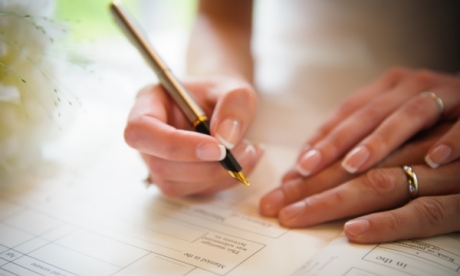Ireland’s Catholic bishops have warned that the Church may no longer perform the civil aspects of weddings if same-sex marriage is legalised.
Ireland is to have a referendum on legal same-sex marriage next month.
If the bishops’ warning comes to pass, it would mean couples married in the Catholic Church in Ireland would have to go elsewhere to have their union legally recognised by the state.
Currently, the signing of a Marriage Registration Form, a civil document, takes place after wedding services in Irish Catholic churches.
The priest, as “solemniser”, as well as witnesses and the married couple must sign the form.
This form is returned to a local registrar before a marriage certificate is obtained.
A spokesperson for the bishops said priests probably wouldn’t have a problem with dropping the civil aspects of church weddings.
Martin Long said: “If the referendum is passed the Church’s view and the state’s view of marriage will be radically different.
“It’s reasonable that the bishops may decide to separate the two.”
Fr Brendan Hoban from the Association of Catholic Priests said that he had heard suggestions that the Church would refuse to carry out the civil role “in a huff”.
But Fr Hoban didn’t think it would happen.
He said: “Why would it bother? It would be unnecessary.
“You’re only making it difficult and more expensive on these couples. I wouldn’t expect to see it.”
The bishops had warned in 2013 that any change in the definition of marriage would mean the Church wouldn’t co-operate with the civil aspects of marriage.
About 4121 of the 5461 people registered as “wedding solemnisers” in Ireland are Catholic priests.
There are only 107 civil registers so the move by the Church would result in a significant delay for couples getting their marriage legally recognised by the state.
Mr Long said that guidelines for dioceses would be considered at a meeting of the Bishops’ Committee on Marriage and Family later this month.
Sources
